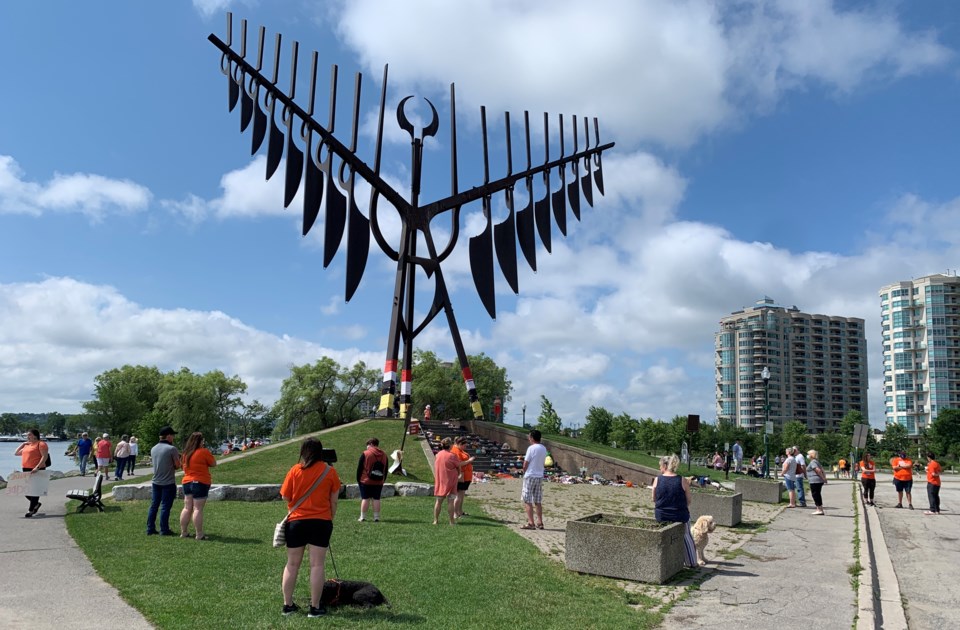The times are changing Canada Day in Barrie.
Council approved a motion Monday that city staff speak on an annual basis with partners such as Beausoleil First Nation, Rama First Nation, Georgina Island First Nation and other local First Nations, Métis, and Inuit peoples and organizations, including the Barrie Native Friendship Centre and Barrie Area Native Advisory Circle, to explore and implement July 1 activities that include local oral histories, cultural celebrations and any other educational elements as recommended by the Indigenous community.
“To be clear, this is not about cancelling the celebrations of Canada Day,” said Coun. Keenan Aylwin, who sponsored the motion with Coun. Natalie Harris. “It’s about adding context and educational elements as the city did, to great success, this past July 1.
“It was really incredible to see the amount of people who came out to the Sacred Fire, and were learning about the history of colonization on this land.”
The Downtown Barrie Business Improvement Association (BIA) will also be asked to include Indigenous history and education in applications for future Canada Day celebrations funding.
And the city’s human resources director and Barrie Police Services will be requested to provide a memo to council, by the second quarter of 2022, that includes initiatives to increase candidate applications that identify as members of the Indigenous community.
“Now is a good time to start this work,” Aylwin said. “I think it’s critical that we engage with local Indigenous peoples organizations and nations in this work, and that we get the ball rolling, see how we can work together to make this a reality.
“The heavy lifting of reconciliation does fall on the provincial and federal governments, but we also have a role to play as the level of government closest to the ground,” he said.
The original motion was changed to make its actions less specific until Indigenous leaders have been further consulted
“I just think we should leave it very open to what they (Native leaders) want, and not what we think they want,” said Coun. Robert Thomson.
There was also conversation about how the National Day for Truth and Reconciliation, Sept. 30, a new statutory holiday in Canada, will work with Canada Day. It will commemorate the tragic legacy of residential schools in Canada.
“Canada Day is a time where a lot of Indigenous people are reflecting on the impacts of colonization, about the history and outgoing impacts,” Aylwin said. “I don’t think you can have too many days in this country talking about those issues. They are so critical to who we are as a country, that we need to be talking about it as much as possible, as much as we can.”
City staff are also to be in contact with local Indigenous Nations, peoples, and organizations on the implementation of the Truth and Reconciliation Commission’s Calls to Action that fall under municipal responsibility, namely Calls to Action #43, #47, and #57, and report back to Barrie councillors by 2021’s end.
Call to Action #43 is ‘We call upon federal, provincial, territorial, and municipal governments to fully adopt and implement the United Nations Declaration on the Rights of Indigenous Peoples as the framework for reconciliation.’
Call to Action #47 is ‘We call upon federal, provincial, territorial, and municipal governments to repudiate concepts used to justify European sovereignty over Indigenous peoples and lands, such as the Doctrine of Discovery and terra nullius, and to reform those laws, government policies, and litigation strategies that continue to rely on such concepts.’
Terra nullius is Latin for land that is legally deemed to be unoccupied or uninhabited, or belonging to no one.
Call to Action #57 is ‘We call upon federal, provincial, territorial, and municipal governments to provide education to public servants on the history of Aboriginal peoples, including the history and legacy of residential schools, the United Nations Declaration on the Rights of Indigenous Peoples, Treaties and Aboriginal rights, Indigenous law, and Aboriginal–Crown relations. This will require skills-based training in intercultural competency, conflict resolution, human rights, and anti-racism.’
The city changed its Canada Day activities this year to be more reflective of a shared history, focusing on reflection, reconciliation and education.
Lights at Meridian Place and t
The city's Canada Day webpage
Virtual programming for Canada
No fireworks or live entertainment were planned to mark Canada Day this year, due to the pandemic’s gathering restrictions.



